When you’re healing from emotional abuse, it can be a little bit difficult to know where you stand. You can have good days, and then suddenly you’re rocked with a terrible day where you can’t stop thinking about the abusive person in your life. This is because recovery is never a straight line. And there’s also something called the trauma bond that’s a natural reaction to the abuse you’ve endured.
You may have heard of the trauma bond before. But we’re going to do a quick recap of what it is exactly (just in case you haven’t). And then we’re going to get into the six signs that you may still be in the trauma bond.
And then at the end, naturally, we’re going to talk about what to do if you are still in the trauma bond.
Related: Trauma Bond Signs: What Is Trauma Bonding and How It Keeps You Stuck In Abusive Relationships
What Is A Trauma Bond?
Trauma bonding refers to an unhealthy attachment that takes place when you’re in a relationship with somebody who is emotionally abusive. And it usually happens as a result of intermittent reinforcement.
So it’s something that looks like love, and then it’s abuse, and then it looks like love again, and then it’s abuse, and your brain gets addicted to that cocktail of cortisol and oxytocin. And there are a whole lot of other neurochemicals that are involved in the process. But essentially, you begin to associate all this upheaval with love. And this keeps you going back to the emotionally abusive person in your life.
Even for the people who know what the trauma bond is, it’s so incredibly important for your healing to understand that this is natural.
So if you’ve gone back to an abusive person, maybe the people in your life are calling you crazy. It happens! They wonder, “How could you do that? This person is terrible to you, and you’ve gone back to them.” Understand that it’s not your fault.
The trauma bond is real, and it is what causes us to have trouble making logical decisions when it comes to these emotionally abusive people.
So I have a video on what happens in the brain with the trauma bond, and you may find that interesting to watch after you’ve read this post. And now, we’re going to jump straight into the six signs that you may still be in the trauma bond.
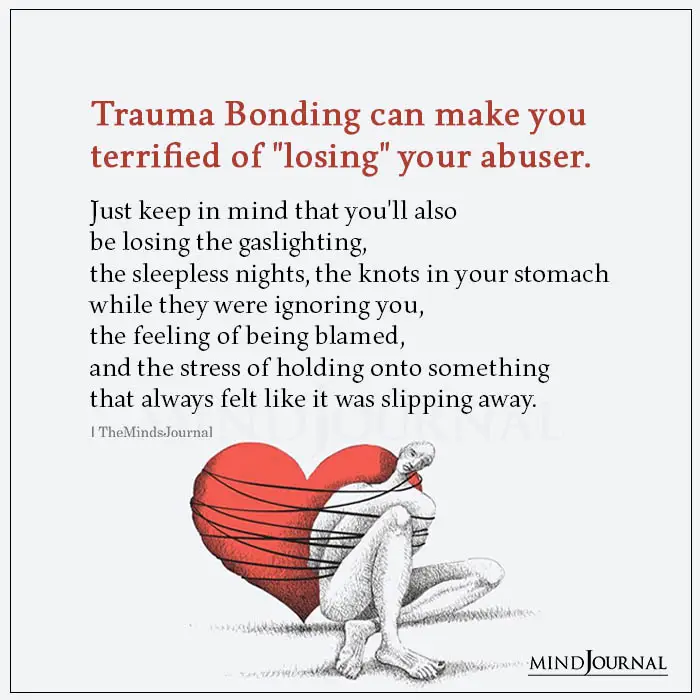
6 Signs You’re In A Trauma Bond
1. Holding Hope That The Narcissist Will Return
So the first sign is that you’re holding hope that the narcissist is going to come back or you’re holding space for the narcissist in your life.
Now, this is an interesting one.
If you’re holding hope that the narcissist is going to come back, you probably know on some level you would be happy if that person came back to you. And this may even be something that fluctuates.
Some days you’re good without this person, and other days you want this person to come back. But if you’re feeling that way, if you’re feeling that way consistently or ever… there’s a good chance you’re still in the trauma bond.
Now, when I talk about holding space for a narcissist, this may be telling of emotions that you’re not consciously aware of.
So if you’re holding off on a big move or a big life change because it’s something that the narcissist wouldn’t approve of (or maybe the move would take you far away from the narcissist), these are signs that -whether you realize it or not- you may be holding space for that person to come back.
And if you can recognize that you’re doing this in your life, you’re probably still in the trauma bond.
Related: Trauma Bond vs Love: 6 Reasons Why You Keep Going Back To Him Even When It Hurts You Every Time
2. Craving The Love-Bombing
So the second sign that you’re still in the trauma bond is that you’re still falling for love bombing. Whether it’s a family member or an ex that comes back, and they come back all sweet and nice, and they’re trying to either be your best friend or long-lost love.
It seems genuine, and you missed this person.
Maybe you even felt like you were good without them, but then they come back and they have this sad story about how much they’ve missed you, and you believe it – even after all you’ve been through.
If you know that this person has been emotionally abusive to you, and if you are relatively sure that this person is likely a narcissist or another cluster B personality, however, you’re still considering going back to this person because “they seem so genuine,” there’s a chance you may still be in the trauma bond.
3. Making Excuses For The Narcissist
The third sign that you may be in the trauma bond is that you’re making excuses for the narcissist. Now, this is super common when you’re in a relationship with a narcissist, but it can carry over afterward, and it often does.
So it’s very difficult for many of us who have been in these relationships to recognize that what has been happening is abuse and to label it as abuse.
But once you can do that, it’s very freeing. Because you can look at things like the trauma bond and you can understand that your reactions to what happened in this relationship are completely natural. Virtually everyone in these relationships has a similar reaction.
So you can let yourself off the hook for so many things. But the key is to recognize it as abuse if it has all the signs of abuse — and evaluate whether you’re taking responsibility for any part of it. If you think the abuse is your fault in any way, you may still be in the trauma bond.
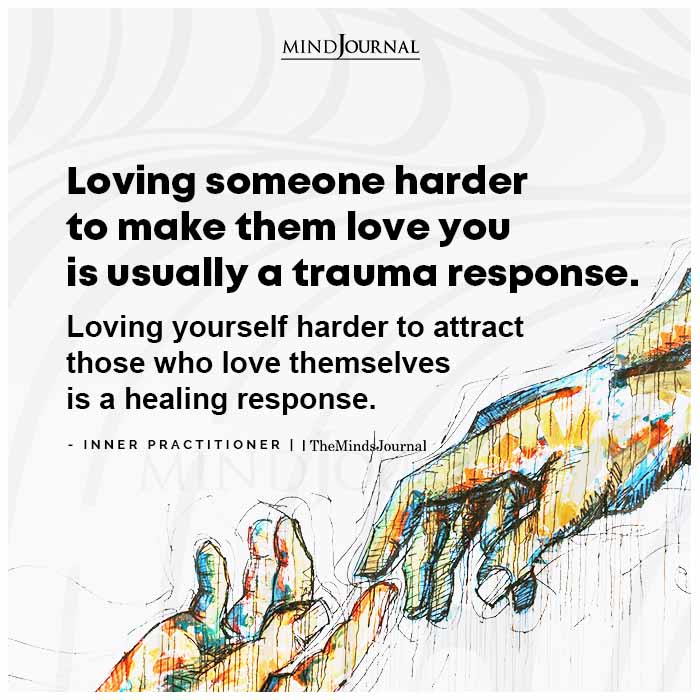
4. Spiritually Tethered To Your Ex
So the fourth sign that you may still be in the trauma bond is that you feel energetically or spiritually tied to this person. And I talked about this in my recent video about the new supply and what happens there.
There’s something that I call an emotional haze. And this is very common among people who identify as empaths.
What happens is the lines get blurred between your energetic field and your emotions and the other person, so they can very easily pull your strings, whether they’re in front of you or if it’s from afar.
You could have gone no contact with this person, but yet they post something on social media, and your emotions bubble up and you almost have no control over what’s happening.
They’re still pulling your emotional strings even though they’re not really in your life. So if this is happening in your life, there’s a very good chance you’re still in the trauma bond.
When I talk about an energetic or spiritual connection, this can often happen when you think about the person and suddenly they text or call you out of nowhere. You haven’t heard from them in ages, but you just had a dream about them or something reminded you of them, and they call or text or show up somewhere.
If things like this are happening, and if you feel like you’re still emotionally or energetically tethered to this person, it’s very important to intentionally detach. Set a clear intention to detach your energy from this person.
And whenever your emotions are triggered, whenever this person is triggering you, or even if you’re triggering yourself by thinking of this person, remember that everything you need to heal is already within you.
Related: Why Is It So Hard to Leave the Narcissist in Your Life?
5. Constantly Thinking About The Ex
The fifth sign that you may still be in the trauma bond is that you spend a lot of time thinking about this emotionally abusive person.
And first I want to say that there are some benefits to recounting some things that have happened. This may be something you want to do with a qualified therapist.
But if it feels like your thoughts are running amok and you’re constantly reminded of things that cause you pain (and every time you do, it hurts you again as if you were still in that situation), then you’re likely in the trauma bond.
6. Subscribing To The Ex’s Reality
The sixth sign that you’re still in the trauma bond is that you’re subscribed to that person’s reality.
So you can see something that’s happening right in front of your face. And you can probably recognize that what’s happening is extremely unhealthy. And as I described in the video, from an objective perspective, it looks like a train wreck. But when you’re emotionally tied to this person, you have trouble seeing it for what it is. You have trouble seeing reality for reality.
What you see is what the narcissist wants you to see when you’re still in the trauma bond. So if you’re still subscribed to their reality, there’s a good chance you’re still trauma bonded.
If you cannot relate to any one of these six things, Congratulations, you’ve made it to the other side.
And if you can relate to them, don’t worry. Because guess what? Every one of us who does not relate to any of these six things once did very much so this is all a natural part of the healing process.
And where you are right now is perfect. It is where you’re meant to be.
The fact that you’re educating yourself about narcissistic abuse and healing means that you are ready to accelerate your healing.

I can tell you from my own experience, that just learning that the trauma bond was a thing was incredibly valuable to me in my journey.
Knowing that I didn’t have to beat myself up over all the things that I was thinking and wanting to go back to an abusive person, I didn’t have to do that anymore. There was a reason, and it’s a logical reason, why this happens.
So if you are still in the trauma bond, I suggest you continue consuming content about narcissistic abuse, emotional abuse, and recovery.
Related: Trauma Bond Healing: 4 Ways You Can Heal Trauma Bond After a Narcissistic Relationship
Learn what you can, know you’re not alone and know that you have nothing to be ashamed of.
And also, you should know that everyone gets to the end in their own time. Everyone heals in their own time. Recovery is never a straight line, so don’t let anybody tell you that you’re taking too long to get over it, or that you should be in a different place right now.
Where you are right now is where you need to be.
The healing process in itself is a journey, and you’re going to get so much out of this. So there’s no need to try to rush it. There’s no need to try to compare yourself to anyone else.
Focus on you, focus on healing, and find the support you need.
This is an incredibly supportive community. Feel free to make comments, ask for help, and ask questions. Whether you’re currently in this place or you’re out there’s value to making connections. Support is so incredibly important in this process. It’s important to know that you’re not alone.
Want to know more about the signs of a trauma bond? Check this video out below about trauma bond relationships!
Written By Common Ego Originally Appeared On Common Ego
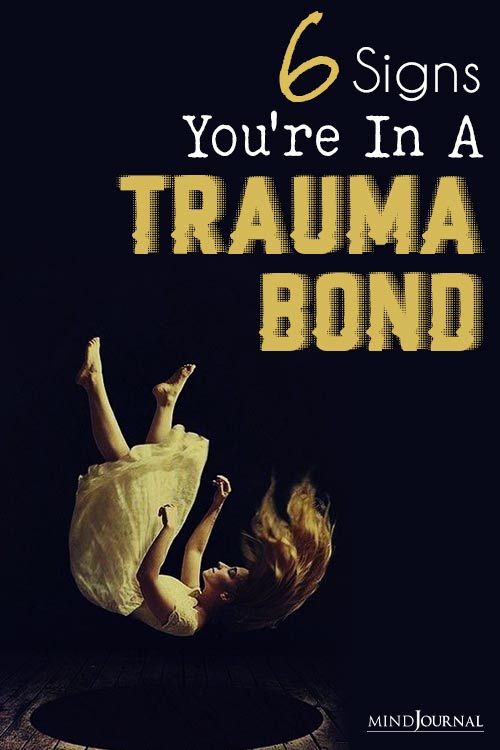
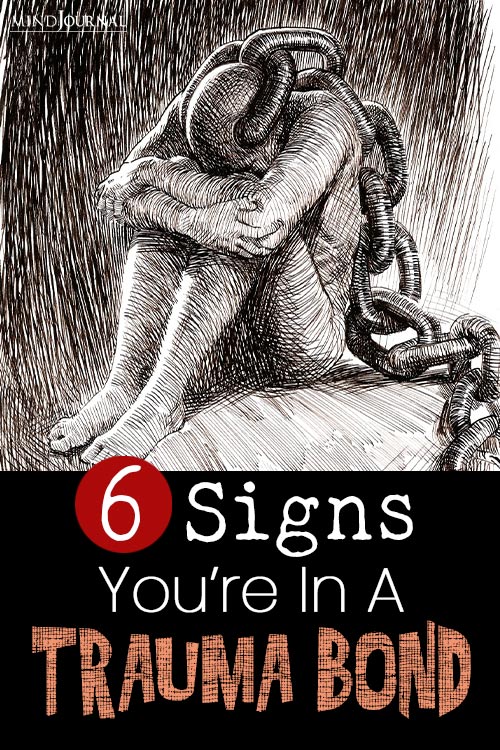
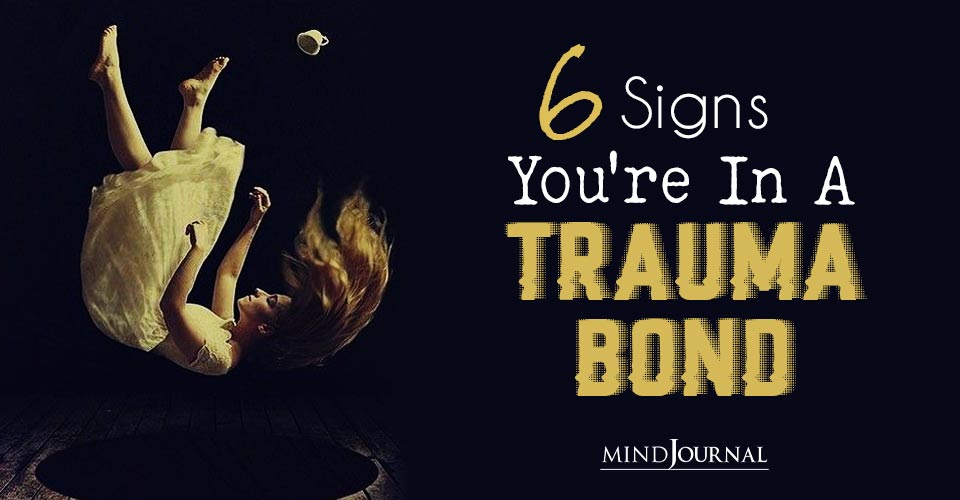





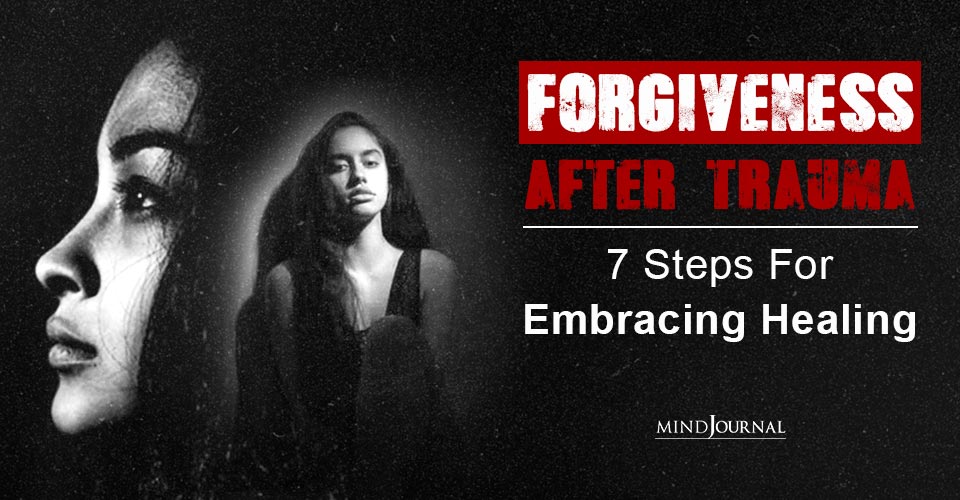

Leave a Reply
You must be logged in to post a comment.